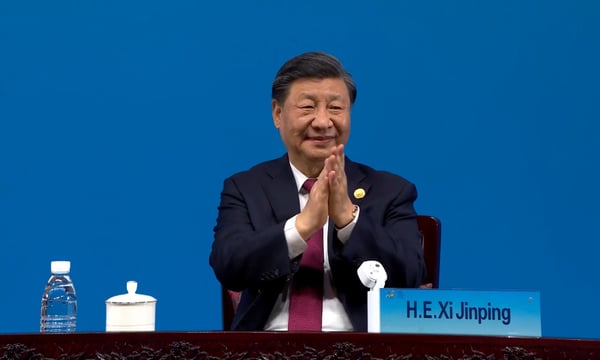In April, U.S. President Donald Trump announced his so-called “Liberation Day,” a set of double-digit tariff hikes on essentially every country in the world. While the original announcement put China squarely in the middle of the pack, when Beijing responded with tariffs of its own Trump made China his primary target. The Trump administration hiked the tariffs on Chinese goods to 74 percent, followed by an additional 50 percent tariff in response to China’s retaliation.
After negotiations in early May, both sides agreed to reduce tariffs on May 14. However, since the announcement of this preliminary agreement, there has been no further progress in the negotiations, despite two more rounds of talks in June and July. U.S. Treasury Secretary Scott Bessent commented that the bilateral talks had become “a bit stalled.”
In June, Trump accused China of violating the trade agreement and threatened further action. Shortly after, however, Trump called China’s Xi Jinping and claimed to have had a “very good talk.” He also spoke of plans to visit China and meet with Xi in person.
In contrast to Trump’s unpredictable nature, China adopted a firm and uncompromising stance. Following the announcement of Trump’s tariffs, the Chinese leadership refused to back down.
On April 5, the Chinese government issued an official statement outlining its position. In the statement, China accused the United States of acting like a bully and infringing on China’s economic interests. It also portrayed itself as a defender of the international trade system, with the WTO at its core, and criticized the U.S. for pursuing hegemony and unilateralism at the expense of others.
China asserted that “the world needs justice, not hegemony,” and declared that “most countries believing in justice will choose the historically correct side.” The statement further emphasized that “Chinese people… do not cause problems, but are not afraid of problems,” signaling the government’s resolve to fight back.
China’s decision to confront the United States is driven not only by strategic considerations but also by nationalism. It represents a moment that Chinese elites – dating back to the late Qing dynasty – have long awaited: the opportunity to push back against the world’s strongest power and assert a dominant position. Despite uncertainty about China’s economic future, the public reacted positively to the government’s unyielding stance.
Following Trump’s global tariff announcement, China launched a diplomatic campaign to rally international support for its position. In meetings with foreign counterparts, Chinese officials conveyed two key messages. First, China positioned itself as a global leader, openly criticizing the Trump tariffs as examples of U.S. “unilateralism, protectionism, and hegemony.” It emphasized the harmful effects of these actions on the international free trade system and the global economy. In this context, China framed its firm stance as a defense of “WTO-centered multilateral trade, the global supply chain, and international justice.”
Second, by reaffirming its commitment to global trade, Beijing sought to present itself as a viable economic partner and alternative to the United States. Amid an economic slowdown, China hoped that expanding business opportunities with other international partners would help offset the negative export impact of Trump’s tariffs.
China tailors its messaging to different international audiences. Toward Europe, it presents itself as a defender of the existing international political and economic order. For years, China has sought to weaken the transatlantic alliance by encouraging Europe to pursue greater “strategic autonomy.” Beijing views Trump’s unpredictability as an opportunity to deepen European skepticism toward the United States.
For example, during an event in Beijing marking the 50th anniversary of China-EU diplomatic relations, Vice President Han Zheng stated that China and Europe should “defend multilateralism, the international system centered on the UN and international law, and the multilateral trade system centered on the WTO.” Similarly, during a phone call with his German counterpart, Foreign Minister Wang Yi declared that China and Germany should “jointly promote free trade and oppose protectionism and unilateralism.”
Beijing hopes that U.S. unpredictability will drive European countries closer to China, providing it with additional leverage in ongoing trade negotiations. For instance, China used the tariff dispute as an opportunity to call for deeper economic cooperation during its negotiations with Germany and subsequently pressured Berlin to address the issue of tariffs on Chinese electric vehicles.
China crafts a different message for the developing world. While continuing to criticize the United States for its “unilateralist” and “hegemonic” policies, China also expresses a stronger commitment to reforming the international system.
Restructuring global governance has become a central priority in Xi Jinping’s foreign policy agenda. The overarching goal is to reshape the international order in a way that resembles the traditional Sino-centric model, in which China occupies a dominant and influential position. While Western countries have largely resisted Beijing’s initiatives, China seeks to build broader support among developing nations. Beijing positions itself as the leader of the Global South, claiming that its development will help empower other developing countries to defend their interests on the world stage.
Following the China-Latin America Forum, for example, Beijing issued a statement calling for reform of the United Nations Security Council to include greater representation from Latin America and other regions in the developing world. China also pledged its support for a Latin American candidate for U.N. secretary-general. In addition, it promised to push for reforms in the international financial system to better reflect the needs and priorities of developing countries.
China’s diplomatic campaign to advance Xi’s Sino-centric global vision faces several challenges. The first is the contradiction between China’s desire to present itself as a reliable economic partner and the perception that it poses an economic threat to many countries. Xi seeks to convert China’s economic strength into international institutional influence by expanding its role in global rule-making. Although China claims to share the benefits of its economic rise, its support for globalization is conditional – primarily pursued when it serves China’s interests. As a result, China’s economic expansion is often perceived as coming at the expense of host countries.
For example, China has become a major competitor in several of Europe’s key industrial sectors, including electric vehicles (EVs), machinery, and wind power. As a result, the Chinese market has become significantly less important to the European Union, as domestic Chinese products have increasingly displaced European goods within China. At the same time, European companies now face growing competition from Chinese firms within their own markets.
The most prominent example is the automobile industry: leading European carmakers fear that an influx of Chinese EVs could overwhelm the European market and threaten the survival of local manufacturers. In response, the EU imposed tariffs on Chinese EVs to protect one of its most vital manufacturing sectors. While China has sought to use Trump-era tariffs as leverage to secure concessions from Europe on EV tariffs, the EU has shown little willingness to back down. This highlights a fundamental divergence between China and the EU on trade policy and industrial competitiveness.
Southeast Asia occupies a central place in China’s strategic calculus. Immediately following Trump’s tariff announcement, Xi visited several Southeast Asian countries, and Premier Li Qiang also traveled to the region in May to meet with local leaders. While both China and Southeast Asian nations pledged to deepen economic ties in response to U.S. trade pressure, the trade relationship is not without its tensions. The influx of Chinese goods threatens to crowd out Southeast Asian firms in their own domestic markets. Although China’s promises of increased investment bring economic opportunities, the expansion of Chinese factories – often accompanied by imported Chinese labor – has raised concerns about local unemployment and even the potential for ethnic tensions.
Furthermore, many Chinese companies are investing in Southeast Asia as a strategy to circumvent U.S. tariffs and restrictions, including those on the U.S. Entity List. This practice risks placing Southeast Asian countries in a difficult position between the United States and China, increasing their exposure to potential American trade penalties.
China’s diplomatic campaign also fails to address the pressing security concerns of its audiences. While Beijing might hope to solely focus on economic cooperation, many countries view national security challenges from China as too significant to set aside. Hence, they often examine Beijing’s offer with caution. For instance, China’s joint declarations with Southeast Asian countries offer little substance on the South China Sea dispute – an issue central to the security interests of many regional states.
The security gap is perhaps even more pronounced in China-Europe relations. Beijing’s continued support for Russia underscores that Europe’s most urgent security challenge is not shared by China. This year marks the 50th anniversary of China-EU diplomatic relations. The EU invited Xi to visit Brussels to commemorate the occasion. However, Xi declined the invitation and instead traveled to Moscow to attend a military parade, where he reaffirmed China’s close ties with Russia. For European leaders, this move was seen as a diplomatic snub.
From the EU’s perspective, China is signaling that it does not view Europe as a priority partner and instead aligns itself with Russia – Europe’s most serious security threat. In doing so, Beijing risks positioning itself as a growing security concern for Europe.
Beijing seeks to capitalize on the Trump administration’s unpredictability to showcase its own leadership, which is central to Xi’s vision of placing China at the center of an alternative world order. In the view of Chinese leaders, a volatile and unreliable United States could push more countries to align with China. However, the reality is far more complex. While Trump’s foreign policy may have eroded international trust in the U.S., this does not necessarily translate into recognition of China’s leadership.






